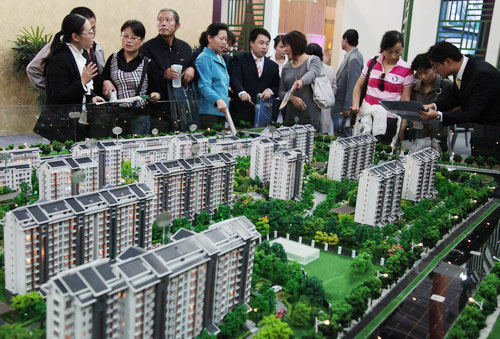Yangzhou housing policy could see govt disapproval
Updated: 2012-05-09 13:13
By Wu Yiyao in Shanghai (China Daily)
|
|||||||||||
Housing-management authorities in Yangzhou, Jiangsu province, introduced a policy on Tuesday that rewards homebuyers who purchase already finished residences, raising questions over whether that offer will come into conflict with the central government's real estate restrictions.
|
 Potential homebuyers look at models of residential property in Yangzhou, Jiangsu province. [Photo/China Daily] |
Yangzhou homebuyers who purchase finished homes, commonly known as refined decorated houses, will receive cash rewards that vary in accordance with the size of the residences they buy, according to a government circular posted on the housing authorities' official website.
A reward worth 0.6 percent of a purchase contract's price will go to those who buy finished houses that occupy up to 90 square meters. For residences taking up from 90 to 120 square meters, the rewards will be worth 0.5 percent of a contract's value and, for residences taking up 120 to 144 square meters, will be worth 0.4 percent of the value, according to the circular. The policy will take effect on July 1 and last a year.
It applies only to the price of a residence, not to the cost of any parking lots, garages or maintenance needs that come with it, the circular said.
The policy began to draw controversy after it had been posted on the housing authorities' website on Tuesday morning. By the afternoon, it had been deleted, only to be posted again in the evening.
Some critics said the policy was local officials' attempt to stimulate the depressed housing market amid the central government's policy meant to restrict sales of residential properties.
"We introduced this policy simply because we want to promote sales of finished houses," said an employee at the housing authority's general office, who spoke on condition of anonymity.
The employee said local officials have no intention of interfering in the real estate market and are only fulfilling their duty to help homebuyers purchase residences that are safe and of a high quality.
"Currently in Yangzhou, finished houses do not make up a significant percentage of all new residential apartments projects," the employee said. "And the reward policy is meant to change that situation."
Alongside the circular about the reward policy was also posted an explanatory note.
"In Yangzhou, we will strictly stick to the central government's macro-control policies and strengthen our control and adjustment policies for the real estate market," the note says.
In Yangzhou, the average price of residential properties is about 8,316 yuan ($1,319) per square meter, according to statistics from the China Index Academy, a property data and consultancy service. Under the new policy, a homebuyer will receive about 4,490 yuan for purchasing a 90-square-meter residence and about 4,790 yuan for a 144-sq-m residence.
"I'll wait and see if further favorable policies will come out so I can buy a house at a lower price," said Xu Xinqi, a Yangzhou resident who said he believes housing prices "have not yet reached their bottom".
Another Yangzhou resident, Hu Xiaoqin, said it's too early to comment on the policy. He said there's a possibility that it conflicts with the central government's housing policies and therefore might end up being canceled.
On February 9, Wuhu, in East China's Anhui province, introduced a policy stipulating that those who buy homes would be exempted from paying taxes on those transactions. It also granted stipends to those who buy houses that occupy up to 90 sq m.
Three days later, the city government announced it would suspend the policy.
Xue Jianxiong, an analyst from China Real Estate Information Corp, said he thinks Yangzhou's new policy will not have a great effect on the local real estate market because the rewards being offered are not large.
Xue said the policy will probably be found to be in conflict with the central government's and, like the similar policies in Wuhu, be revoked.
wuyiyao@chinadaily.com.cn
Related Stories
Housing prices decline by 0.7% in big cities in April 2012-05-03 09:48
China's potential house-buyers hit record low 2012-03-21 17:01
China must reexamine housing to continue sustainable growth 2012-03-15 15:01
Housing price regulation won't slacken 2012-03-15 08:17
Yangzhou builds 'tracks' for international funds and industries 2003-07-28 15:59
Today's Top News
President Xi confident in recovery from quake
H7N9 update: 104 cases, 21 deaths
Telecom workers restore links
Coal mine blast kills 18 in Jilin
Intl scholarship puts China on the map
More bird flu patients discharged
Gold loses sheen, but still a safe bet
US 'turns blind eye to human rights'
Hot Topics
Lunar probe , China growth forecasts, Emission rules get tougher, China seen through 'colored lens', International board,
Editor's Picks

|

|

|

|

|

|





